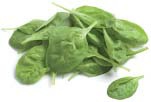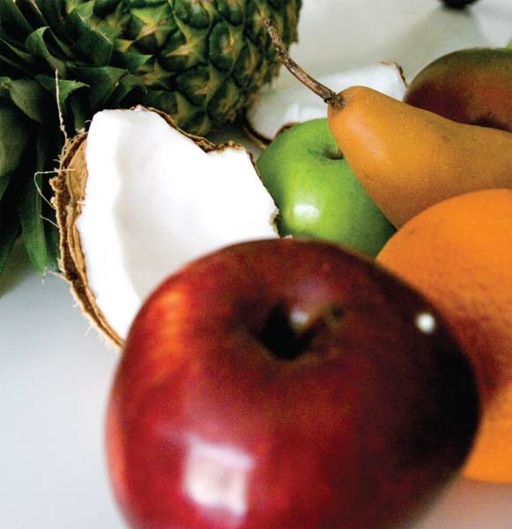The Healthy Green Drink Diet (6 page)
Read The Healthy Green Drink Diet Online
Authors: Jason Manheim
146 mg potassium
8 mg sodium
1087 IU vita A
.068 mg riboflavin
.033 mg vita B6
8.1 mg vita C
~ vita E
~ vita K
Easy to grow throughout the year, mint is good for more than just a soothing winter tea or invigorating
summer beverage. Many studies have shown mint to be a fantastic remedy for upset stomachs from
ailment such as IBS, indigestion, and other colonic issues. It gives any drink a burst of refreshing flavor,
and the aroma can even cure nausea and headaches.
Mustard Greens
2 cups chopped (112 g), raw
3.02 g protein
3.7 g fiber
115 mg calcium
1.64 mg iron
396 mg potassium
28 mg sodium
11760 IU vita A
.123 mg riboflavin
.202 mg vita B6



78.4 mg vita C
2.25 mg vita E
.56 mg vita K
Hello, cruciferous vegetable, long time no see. Mustard greens are a great addition to your detox regime;
it contains many antioxidant nutrients and phytonutrients that help the body eliminate unwanted toxins. Be
warned, though, these leafy greens have a spicy, tangy punch that will leave you chasing with cold water.
Best mixed with less bold greens and a few sweet fruits.
Parsley
2 cups chopped (120 g), raw
3.56 g protein
4 g fiber
166 mg calcium
7.44 mg iron
665 mg potassium
67 mg sodium
10109 IU vita A
.118 mg riboflavin
.108 mg vita B6
159.6 mg vita C
.9 mg vita E
1.97 mg vita K
Not just a table garnish, folks. The oils in parsley can neutralize some carcinogens and is a great source of
folic acid, which keeps your heart functioning healthily and it combats colon and cervix cancer. It really
brings out the flavors of other ingredients and is especially tasty with celery and tomatoes. It also lasts
much longer than other greens when you store it in a plastic bag in the refrigerator.
Spinach
2 cups (60 g), raw
1.72 g protein
1.3 g fiber
59 mg calcium
1.63 mg iron
335 mg potassium
47 mg sodium
5626 IU vita A
.113 mg riboflavin
.117 mg vita B6
16.9 mg vita C
1.22 mg vita E
.29 mg vita K
Known as one of the world’s healthiest vegetables, it’s no wonder Popeye was able to defeat Bluto time
and time again. Spinach is rich in vitamins A, C, B2, B6, e, and K, manganese, folate, magnesium, iron,
calcium, and potassium. Spinach is also nearly 50 percent protein. However, due to the oxalic acid,
which can combine with metals in the body and irritate the kidneys, it is recommended to get a wide
variety of leafy greens and not depend on spinach alone. Despite that, and because I have a diet high in
liquids which flushes the majority of metal compounds in by body, it’s my go-to green and can be added
to any drink without compromising flavor. I usually stock my fridge with bags of it from Trader Joe’s.
Because of the mild flavor and texture, kids and green drink novices love it too.
Turnip Greens
2 cups chopped (110 g), raw


1.65 g protein
3.5 g fiber
209 mg calcium
1.21 mg iron
326 mg potassium
44 mg sodium
12746 IU vita A
.110 mg riboflavin
.29 mg vita B6
66 mg vita C
3.15 mg vita E
.28 mg vita K
I like to think of these as stage one mustard greens. They’re pungent and a bit spicy but won’t have you
running for a glass of water like mustard greens do. They’re a great source of vitamins A, C, and K, folate
and fiber. Like mustard greens, they’re great for detox support, are rich in antioxidants, and provide anti-inflammatory benefits. It’s a great way to add some new greens while providing a flavorful punch.
Watercress
2 cups chopped (68 g), raw
1.56 g protein
.3 g fiber
82 mg calcium
.14 mg iron
224 mg potassium
28 mg sodium
2170 IU vita A
.082 mg riboflavin
.088 mg vita B6
29.2 mg vita C
.68 mg vita E
.17 mg vita K
Historically, watercress has been praised for its healing properties. In fact, it’s said that hippocrates, the
father of Western medicine, built his hospital near a stream so he could have access to fresh watercress
while treating the sick. It’s high in vitamins A, C, and beta-carotene and has been shown to reduce DNA
damage in white blood cells. It’s mildly bitter and spicy, and I usually use it as a substitute for wheatgrass
when I don’t want to bother juicing it.
Other Greens, Lettuces, Weeds, and Veggies
Try some of the following to add a bit of variety to your smoothies and juices:
fresh tarragon
kohlrabi tops
carrot tops
anise/fennel
purslane
lamb’s-quarter
radish
green onion
fresh oregano
mizuna
radicchio
beets
brussels sprouts
Adding Fruit
By now you have at least
tried
a green drink, right? Let me guess, something with 90 percent fruit and
10 percent greens and you loved it?… You’re not alone. Most people start off that way, after all,
eating something sweet is much easier than trying to gulp down a glass of whipped bitter greens when
you’re not used to it. however, here’s where I bum you out a bit and make your adoption of the Green
Drink Diet a bit more challenging: fruit is full of sugar. Fructose to be specific.
That’s not to say that fruit isn’t healthy, it is. In fact, aside from greens, fruits have the most vitamins and
minerals pound for pound than any other food. But if your goal is weight loss and possibly lowering your
cholesterol, then limiting your fructose consumption is probably a good idea. Studies have shown that
diets high in fat, as commonly thought, are not the main culprit of weight gain and high LDL cholesterol,
sugar is.
That being said, there’s nothing wrong with a little fruit in your diet, especially for those attempting to
transition into a more greencentric supplemental drink or those transitioning out of a more processed
Americanized diet.
Fresh berries are a staple in my smoothie regimen, specifically blueberries for their antioxidant
properties and because sometimes I prefer a blue tinge to the radioactive green. Another staple is
bananas; not for any nutritional benefit, (although they are high in potassium and fiber), but because they
pull the smoothies together. They bind flavors and give the drink a delicious creamy texture.


